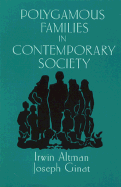Book contents
- Frontmatter
- Contents
- Foreword
- Preface and acknowledgments
- 1 Introduction
- Historical background
- Early stages of relationships
- Home environments of plural families
- Managing everyday life
- 13 The rotation process: Husbands and wives alone together
- 14 Budget and resource management
- 15 Celebrations and holidays
- Social-emotional and family relationships
- Appendix A Methodology and procedure
- Appendix B Demographics of Mormon polygyny
- Notes
- References
- Index
15 - Celebrations and holidays
Published online by Cambridge University Press: 05 May 2010
- Frontmatter
- Contents
- Foreword
- Preface and acknowledgments
- 1 Introduction
- Historical background
- Early stages of relationships
- Home environments of plural families
- Managing everyday life
- 13 The rotation process: Husbands and wives alone together
- 14 Budget and resource management
- 15 Celebrations and holidays
- Social-emotional and family relationships
- Appendix A Methodology and procedure
- Appendix B Demographics of Mormon polygyny
- Notes
- References
- Index
Summary
Celebrations and holidays are an integral part of family life. They punctuate and provide variation from daily routines of school, work, and home management; they mark important seasons, religious, and cultural events; they often include unique rituals and activities. Some celebrations single out individuals, families, or interpersonal relationships. Thus birthdays honor individuals; wedding anniversaries commemorate a couple, and families often display their unity through these same celebrations. In many cases, families develop their own traditions, such as vacation trips, reunions, picnics, and dinner gatherings, often symbolizing family unity and distinctiveness. Other celebrations and holidays are associated with religious, ethnic, and community occasions. Religious observances may occur daily, weekly, or less frequently and may be observed at home or in formal places of worship. Other events may involve ethnic or national heritages and national holidays such as the Fourth of July, Thanksgiving, Mother's Day, and Father's Day. Many of these events have community- or society-wide traditions and modes of observance. However, individuals and families often add their own unique celebratory twists, lending a sense of family unity to a community celebration.
Again, the key issue here concerns the interplay of dyadic and communal processes in holidays and celebrations observed by contemporary polygynous families. Are national and community events observed communally by a whole family, in separate dyadic family clusters, or in some mixed way? And what about birthdays or wedding anniversaries?
- Type
- Chapter
- Information
- Polygamous Families in Contemporary Society , pp. 318 - 336Publisher: Cambridge University PressPrint publication year: 1996



